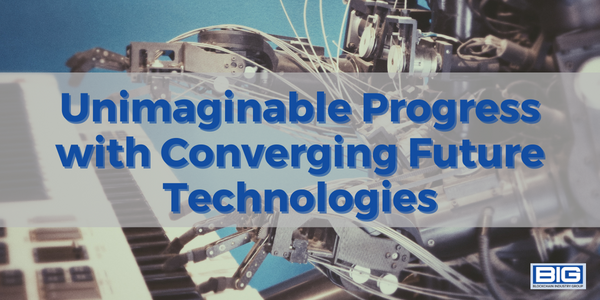
The convergence of future technologies has the potential to drive exponential progress and change, transforming industries and society in unprecedented ways. This progress and change could be driven by the development of highly advanced and intelligent systems that can perform complex tasks and functions, as well as by the creation of new materials, therapies, and technologies that can solve pressing challenges and meet the needs of society. The convergence of these technologies could enable significant improvements in areas such as healthcare, education, transportation, and energy, as well as in the overall well-being and prosperity of individuals and communities around the world. Overall, the convergence of future technologies has the potential to drive positive and transformative change, driving progress towards a better future for all.
- Artificial intelligence and robotics: The convergence of artificial intelligence (AI) and robotics technology could enable the development of highly advanced and autonomous systems that can perform a wide range of tasks and functions. This could have significant implications for industries such as manufacturing, healthcare, and transportation, as well as for society more broadly.
- Biotechnology and nanotechnology: The convergence of biotechnology and nanotechnology could enable the development of new materials, drugs, and therapies that are highly targeted and effective at the molecular level. This could have significant implications for healthcare, as well as for industries such as energy, agriculture, and manufacturing.
- Virtual reality and augmented reality: The convergence of virtual reality (VR) and augmented reality (AR) technology could enable the development of highly immersive and interactive experiences that blur the line between the physical and digital worlds. This could have significant implications for industries such as entertainment, education, and retail, as well as for society more broadly.
- Quantum computing and machine learning: The convergence of quantum computing and machine learning could enable the development of highly advanced and powerful computing systems that can perform complex calculations and analysis at an exponential speed. This could have significant implications for a wide range of industries and applications, such as financial modeling, drug discovery, and weather forecasting.
- Blockchain and internet of things: The convergence of blockchain technology and the internet of things (IoT) could enable the development of highly secure and decentralized systems that can facilitate the exchange of data and value between connected devices. This could have significant implications for industries such as supply chain management, financial services, and healthcare, as well as for society more broadly.
- 3D printing and materials science: The convergence of 3D printing and materials science could enable the development of new materials and manufacturing techniques that can produce highly customized and complex products at low cost and on-demand. This could have significant implications for industries such as manufacturing, construction, and aerospace, as well as for society more broadly.
- Renewable energy and energy storage: The convergence of renewable energy technology and energy storage could enable the development of highly efficient and reliable systems that can store and distribute renewable energy at scale. This could have significant implications for the energy industry, as well as for industries such as transportation and manufacturing, and for society more broadly.
- Biomedical engineering and genomics: The convergence of biomedical engineering and genomics could enable the development of new therapies and treatments that are highly personalized and effective based on an individual’s genetic profile. This could have significant implications for healthcare, as well as for industries such as pharmaceuticals and insurance.
- Environmental science and geospatial technology: The convergence of environmental science and geospatial technology could enable the development of new tools and systems that can monitor and analyze the environment in real-time at a global scale. This could have significant implications for industries such as agriculture, forestry, and energy, as well as for society more broadly.
- Cybersecurity and cryptography: The convergence of cybersecurity and cryptography could enable the development of highly advanced and secure systems that can protect against cyber threats and ensure the privacy of data. This could have significant implications for industries such as finance, healthcare, and government, as well as for society more broadly.
- Neuromodulation and brain-computer interfaces: The convergence of neuromodulation and brain-computer interfaces could enable the development of new therapies and technologies that can modulate brain activity and improve brain function. This could have significant implications for healthcare, as well as for industries such as education and entertainment.
- Space exploration and earth observation: The convergence of space exploration and earth observation could enable the development of new tools and technologies that can provide insights into the Earth’s environment and climate, as well as other planets and celestial bodies. This could have significant implications for industries such as agriculture, forestry, and energy, as well as for society more broadly.
- Natural language processing and machine learning: The convergence of natural language processing and machine learning could enable the development of highly advanced and intelligent systems that can understand and process human language in real-time. This could have significant implications for industries such as customer service, education, and entertainment, as well as for society more broadly.
- Autonomous vehicles and transportation infrastructure: The convergence of autonomous vehicles and transportation infrastructure could enable the development of highly efficient and safe transportation systems that can optimize the movement of people and goods. This could have significant implications for industries such as transportation, logistics, and urban planning, as well as for society more broadly.
- Renewable energy and energy efficiency: The convergence of renewable energy technology and energy efficiency could enable the development of highly efficient and sustainable systems that can reduce energy consumption and increase the use of renewable energy sources. This could have significant implications for industries such as manufacturing, transportation, and construction, as well as for society more broadly.
5 Benefits of Robotics Technology
—
Challenges Confronting Web3’s Decentralized Future
—
Entertainment and the Promise of Future Technology
—
Explore More Future Technology Blogs



